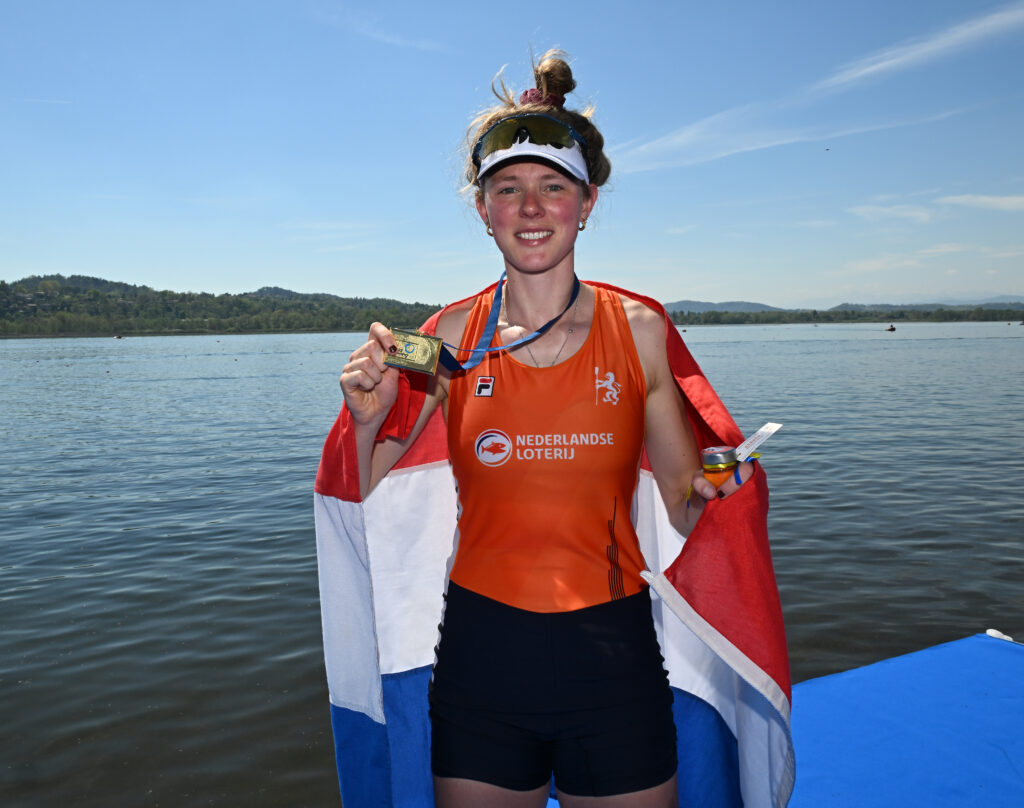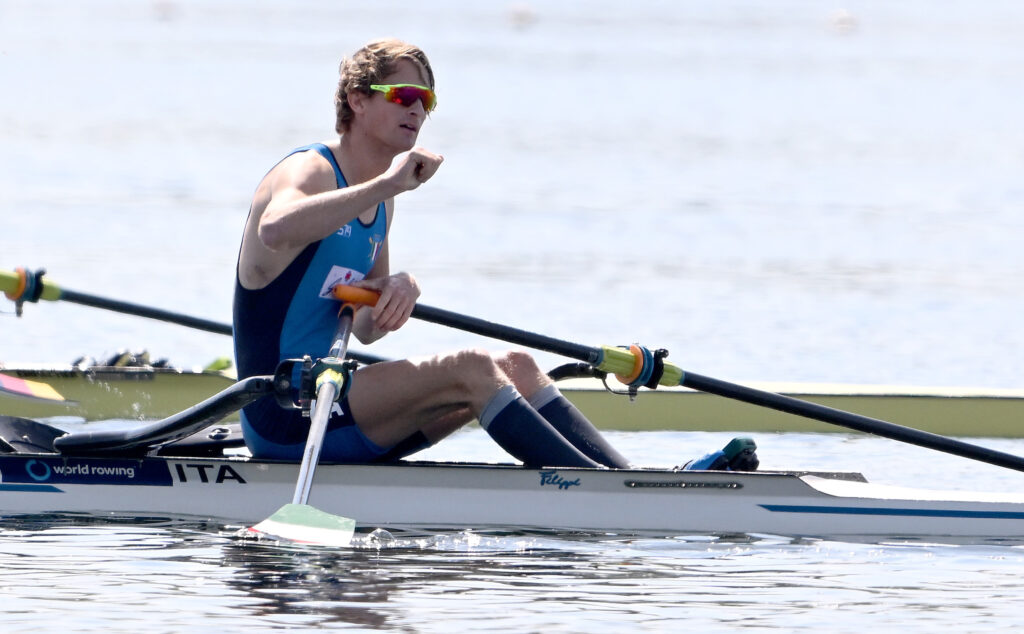
15 Apr 2024
Monday debrief: Varese sunshine gets Olympic year off to blazing start
With the eyes of the sporting world firmly fixed on the Paris 2024 Olympic Games, now approaching fast, rowers from around the world gathered in Varese, Italy last weekend for the first World Rowing Cup of the year. And what a start it was! Here’s the debrief.
A venue so lovely it distracts from the pain
“I was a bit distracted because the mountains are so beautiful, so it was really nice during the race when it felt a bit heavy on my legs, I just looked at the mountains and I thought OK, I’m really lucky to be here.”
That was the verdict of Dutch lightweight single sculler Tosca Kettler, after she picked up bronze on Saturday. And there was plenty of praise from around the course on the beauty of the Lago di Varese, which turned on its best side for the regatta.
After weeks of torrential rain meant the lake burst its banks, the organisers pulled out all the stops to make sure the World Rowing Cup could go ahead. It was still windy on Wednesday, halting training, but by the day before the regatta the wind dropped and the snow-capped mountains at the end of the lake shone in the sunshine – a truly magical sight.
Nevertheless, there were reminders of how wet it had been, as rowers tramped around the boat park in wellington boots and water lapped at the foot of the grandstand, a warning to fans not to drop anything into the lake.
Speaking of fans, there were lots of them from around the world, all enjoying the warm sunshine and a gelato or two by the lake.
Florijn, Craig and Grant assert their dominance

There were two crews racing in Varese who have not lost a race this Olympiad in their boat class – the Netherlands’ Karolien Florijn in the women’s single sculls, and Great Britain’s Emily Craig and Imogen Grant in the lightweight women’s double sculls.
Anyone betting against the two boats at World Rowing Cup I would have lost big-time. In a day filled with close margins, Florijn and the British double both won their finals by over six seconds.
While there are plenty of other crews out there still to come into the mix, their dominance is a warning to the rest of the world that anyone wanting to challenge for Olympic gold in these events is going to have to do something pretty special to overturn the winning streaks.
Starting gun fired for Paris
Speaking of the Olympics, World Rowing Cup I was a chance for crews to say to their coaches “pick me!” for boats already qualified, and boats yet to qualify. Italy’s lightweight women’s double sculls crews finished just 0.02 seconds apart, but only one can go to the Final Olympic Qualification Regatta in Lucerne next month. We don’t envy the Italian selectors.
The job is a bit easier for coaches of single scullers, and a number impressed in Varese ahead of the European Olympic Qualification Regatta in Hungary in just 10 days’ time. We’ll be keeping an eye on the likes of Belgium’s Tim Brys and Portugal’s Andre Pinto, and Ukraine’s Yevheniia Dovhodko, among those who have a chance to qualify in Szeged.
They could of course ask Fie Udby Erichsen for advice. The Dane has competed at three Olympic Games, winning silver in the women’s single sculls at London 2012, but she’s had to go through final qualification every time. Given that she and Hedvig Rasmussen picked up a good bronze medal in the women’s pair in Varese, there’s a good chance Erichsen could make it four from four in 2024.
Never, ever rule the Italians out
It’s no secret that Italian crews know how to sprint and several other boats were given a timely reminder that giving the men and women in blue any quarter is opening yourself up for disappointment.
First up were the Swiss lightweight men’s double, whose 1.5 second lead at 500m to go in the final might have looked reasonable until Italy 1 turned on the afterburners. Next in line for a lesson was the British men’s four, whose mid-race pace looked unbeatable until Italy produced a final 500m that was 1.5 seconds quicker than anyone else’s.
And then there’s an honorary mention for the Italian women’s eight, who basically sprinted for 2000m and found another gear in the last 500m against the British.
What is the Italian for ‘sprint’, anyway?
Rowing, a family affair
Rowing tends to run in families and in Varese four sets of siblings came away with medals, in different events.

Italy’s Patrick Rocek started things off with his gold in the lightweight men’s single sculls and afterwards hurried over to hug his twin sister Aisha. She added to the Rocek medal collection on Sunday with gold in the women’s eight.
Another family taking two gold medals home are the Florijns; after her little brother Finn won the men’s quadruple sculls, Karolien was victorious in the women’s single sculls. Not to be outdone on the Dutch team, Rik Rienks won men’s four bronze, and his younger brother Ralf won men’s eight silver.
Finishing off the family medals in Varese were the Ford siblings of Great Britain. Emily, the younger, won silver in the women’s four and eight before her brother Tom added gold in the men’s eight.
Generosity across borders
Finally, there was a heartwarming tale in the lightweight women’s single sculls. On Wednesday night, before travelling to Varese, Norwegian lightweight single sculler Maia Lund’s boat was blown off its rack and badly damaged. Lund feared she would be unable to race – but Switzerland’s Olivia Nacht, who had moved into the double scull after Frederique Rol pulled out, kindly offered the loan of her boat.
Luckily Nacht and Lund have the same model of Empacher single, so it was an easy switch for the Norwegian, and Nacht’s boat duly helped deliver a silver medal for Norway on Saturday.
“Nénuphar having fun out there,” commented Nacht’s doubles partner Eline Rol on Instgram after the race, to which Nacht replied: “Yess she likes to see some fast splits!”
Now that’s the kind of generosity and sportsmanship that should be rewarded.

